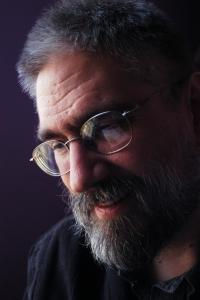Philo of Alexandria
To begin this journey through the great writings of the western mystics, we're dipping a good two thousand years back in time... to the great city of Alexandria, where a Hellenized Jew named Philo‚ — arguably the father of western mysticism‚ — lived and wrote.
 Philo lived from approximately 20 BCE to 50 CE. Scholars appear hesitant to call him a "philosopher," seeing his work less in terms of original thought and more as a matter of exegesis (interpretation of other texts, particularly the Hebrew Scriptures) and eclectic sythesis (integrating Greek pagan philosophy with Jewish spirituality). He came from an affluent background and was influential enough to appear before the emperor Caligula to plead for the welfare of the Jewish community. A prolific author, his writings covered not only philosophy and exegesis, but also history, apologetics, and‚ — of signal interest to us‚ — mysticism. The Oxford Dictionary of the Christian Church says, "As a spiritual leader, Philo stands in the tradition of the philosophical mystics. The highest grade of the inner life is ecstasy, which conveys the felt Presence of God to the soul." Philo was one of the earliest exegetes to champion an allegorical approach to understanding the Hebrew scriptures, a strategy that allowed him to argue for the essential coherence between Greek and Hebrew thought.
Philo lived from approximately 20 BCE to 50 CE. Scholars appear hesitant to call him a "philosopher," seeing his work less in terms of original thought and more as a matter of exegesis (interpretation of other texts, particularly the Hebrew Scriptures) and eclectic sythesis (integrating Greek pagan philosophy with Jewish spirituality). He came from an affluent background and was influential enough to appear before the emperor Caligula to plead for the welfare of the Jewish community. A prolific author, his writings covered not only philosophy and exegesis, but also history, apologetics, and‚ — of signal interest to us‚ — mysticism. The Oxford Dictionary of the Christian Church says, "As a spiritual leader, Philo stands in the tradition of the philosophical mystics. The highest grade of the inner life is ecstasy, which conveys the felt Presence of God to the soul." Philo was one of the earliest exegetes to champion an allegorical approach to understanding the Hebrew scriptures, a strategy that allowed him to argue for the essential coherence between Greek and Hebrew thought.
Philo became quite influential, particularly in his hometown of Alexandria. Both Origen and Clement of Alexandria, as two of the earliest Christian mystics, drew heavily on Philo's thought.
I will be reading Philo with two particular questions in mind: how can his efforts to integrate pagan and Abrahamic wisdom be useful to spiritual seekers today? and, in what ways is his thought important for understanding the grand tradition of mystics who followed him?
Click here to buy a copy of Philo's The Contemplative Life, The Giants and Selections
 Philo lived from approximately 20 BCE to 50 CE. Scholars appear hesitant to call him a "philosopher," seeing his work less in terms of original thought and more as a matter of exegesis (interpretation of other texts, particularly the Hebrew Scriptures) and eclectic sythesis (integrating Greek pagan philosophy with Jewish spirituality). He came from an affluent background and was influential enough to appear before the emperor Caligula to plead for the welfare of the Jewish community. A prolific author, his writings covered not only philosophy and exegesis, but also history, apologetics, and‚ — of signal interest to us‚ — mysticism. The Oxford Dictionary of the Christian Church says, "As a spiritual leader, Philo stands in the tradition of the philosophical mystics. The highest grade of the inner life is ecstasy, which conveys the felt Presence of God to the soul." Philo was one of the earliest exegetes to champion an allegorical approach to understanding the Hebrew scriptures, a strategy that allowed him to argue for the essential coherence between Greek and Hebrew thought.
Philo lived from approximately 20 BCE to 50 CE. Scholars appear hesitant to call him a "philosopher," seeing his work less in terms of original thought and more as a matter of exegesis (interpretation of other texts, particularly the Hebrew Scriptures) and eclectic sythesis (integrating Greek pagan philosophy with Jewish spirituality). He came from an affluent background and was influential enough to appear before the emperor Caligula to plead for the welfare of the Jewish community. A prolific author, his writings covered not only philosophy and exegesis, but also history, apologetics, and‚ — of signal interest to us‚ — mysticism. The Oxford Dictionary of the Christian Church says, "As a spiritual leader, Philo stands in the tradition of the philosophical mystics. The highest grade of the inner life is ecstasy, which conveys the felt Presence of God to the soul." Philo was one of the earliest exegetes to champion an allegorical approach to understanding the Hebrew scriptures, a strategy that allowed him to argue for the essential coherence between Greek and Hebrew thought.Philo became quite influential, particularly in his hometown of Alexandria. Both Origen and Clement of Alexandria, as two of the earliest Christian mystics, drew heavily on Philo's thought.
I will be reading Philo with two particular questions in mind: how can his efforts to integrate pagan and Abrahamic wisdom be useful to spiritual seekers today? and, in what ways is his thought important for understanding the grand tradition of mystics who followed him?
Click here to buy a copy of Philo's The Contemplative Life, The Giants and Selections

